Strategic Analysis of Squire Hotel Group: EFQM Model and Performance
VerifiedAdded on 2023/01/13
|25
|5966
|26
Report
AI Summary
This report examines the application of the European Foundation for Quality Management (EFQM) model to Squire Hotel Group (SHG), a three-star hotel chain facing challenges such as inadequate bed capacity, stiff competition, and budget limitations affecting service quality. The report provides an executive summary, introduction, and a detailed analysis of SHG's quality issues, including the need for modernized room entryways, expansion plans for peak seasons, and menu improvements. It explores the EFQM model's principles, advantages, and its application to SHG, focusing on leadership, strategy, people, partnerships, and process management. The report also cites examples of successful EFQM implementation in other organizations and identifies potential challenges during implementation, offering recommendations to improve SHG's performance and competitiveness within the hospitality industry. The objective is to improve occupancy through enhanced service and product characteristics, modernized facilities, and menu innovation, aiming to retain existing customers and attract new ones.
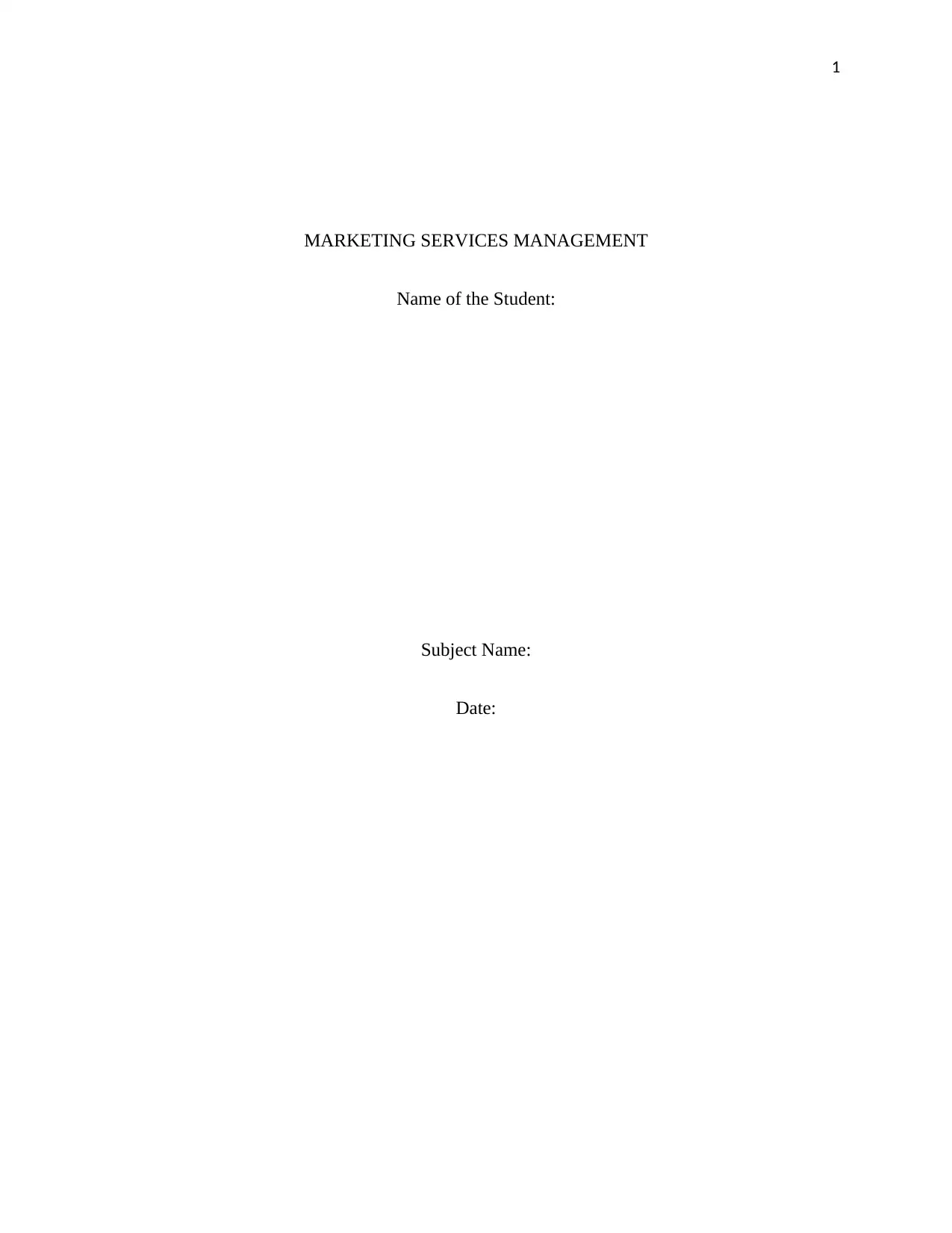
1
MARKETING SERVICES MANAGEMENT
Name of the Student:
Subject Name:
Date:
MARKETING SERVICES MANAGEMENT
Name of the Student:
Subject Name:
Date:
Paraphrase This Document
Need a fresh take? Get an instant paraphrase of this document with our AI Paraphraser
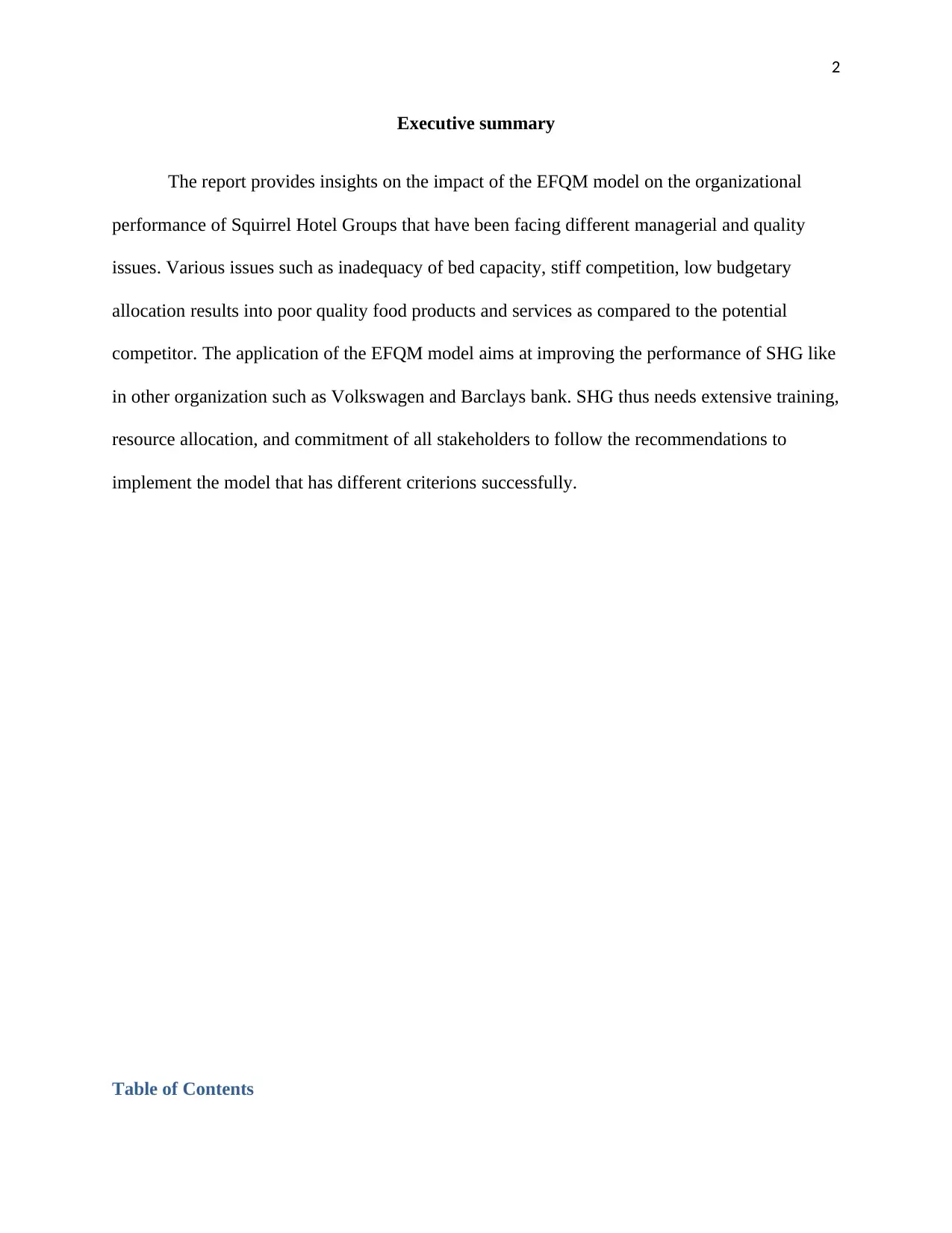
2
Executive summary
The report provides insights on the impact of the EFQM model on the organizational
performance of Squirrel Hotel Groups that have been facing different managerial and quality
issues. Various issues such as inadequacy of bed capacity, stiff competition, low budgetary
allocation results into poor quality food products and services as compared to the potential
competitor. The application of the EFQM model aims at improving the performance of SHG like
in other organization such as Volkswagen and Barclays bank. SHG thus needs extensive training,
resource allocation, and commitment of all stakeholders to follow the recommendations to
implement the model that has different criterions successfully.
Table of Contents
Executive summary
The report provides insights on the impact of the EFQM model on the organizational
performance of Squirrel Hotel Groups that have been facing different managerial and quality
issues. Various issues such as inadequacy of bed capacity, stiff competition, low budgetary
allocation results into poor quality food products and services as compared to the potential
competitor. The application of the EFQM model aims at improving the performance of SHG like
in other organization such as Volkswagen and Barclays bank. SHG thus needs extensive training,
resource allocation, and commitment of all stakeholders to follow the recommendations to
implement the model that has different criterions successfully.
Table of Contents
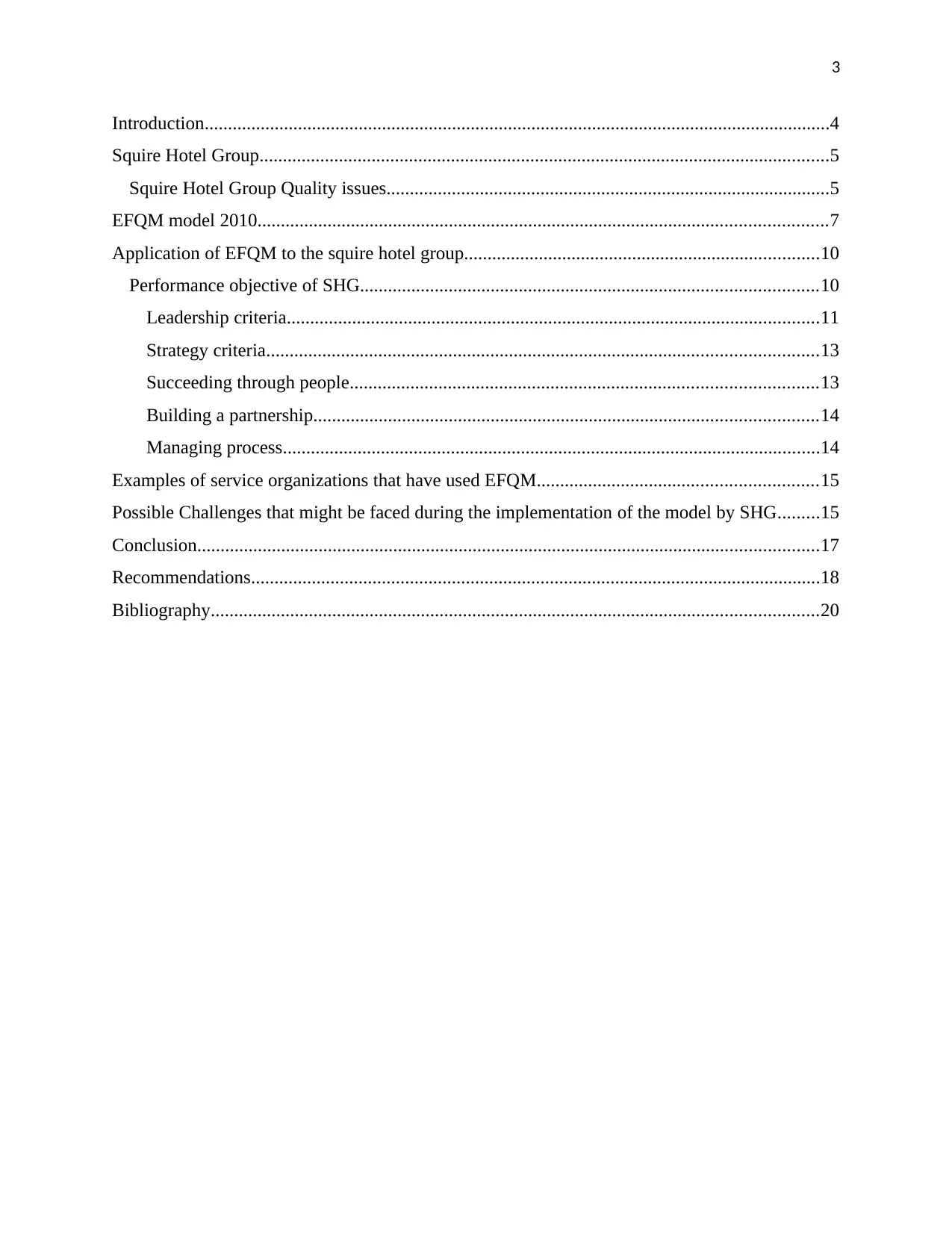
3
Introduction......................................................................................................................................4
Squire Hotel Group..........................................................................................................................5
Squire Hotel Group Quality issues...............................................................................................5
EFQM model 2010..........................................................................................................................7
Application of EFQM to the squire hotel group............................................................................10
Performance objective of SHG..................................................................................................10
Leadership criteria..................................................................................................................11
Strategy criteria......................................................................................................................13
Succeeding through people....................................................................................................13
Building a partnership............................................................................................................14
Managing process...................................................................................................................14
Examples of service organizations that have used EFQM............................................................15
Possible Challenges that might be faced during the implementation of the model by SHG.........15
Conclusion.....................................................................................................................................17
Recommendations..........................................................................................................................18
Bibliography..................................................................................................................................20
Introduction......................................................................................................................................4
Squire Hotel Group..........................................................................................................................5
Squire Hotel Group Quality issues...............................................................................................5
EFQM model 2010..........................................................................................................................7
Application of EFQM to the squire hotel group............................................................................10
Performance objective of SHG..................................................................................................10
Leadership criteria..................................................................................................................11
Strategy criteria......................................................................................................................13
Succeeding through people....................................................................................................13
Building a partnership............................................................................................................14
Managing process...................................................................................................................14
Examples of service organizations that have used EFQM............................................................15
Possible Challenges that might be faced during the implementation of the model by SHG.........15
Conclusion.....................................................................................................................................17
Recommendations..........................................................................................................................18
Bibliography..................................................................................................................................20
⊘ This is a preview!⊘
Do you want full access?
Subscribe today to unlock all pages.

Trusted by 1+ million students worldwide
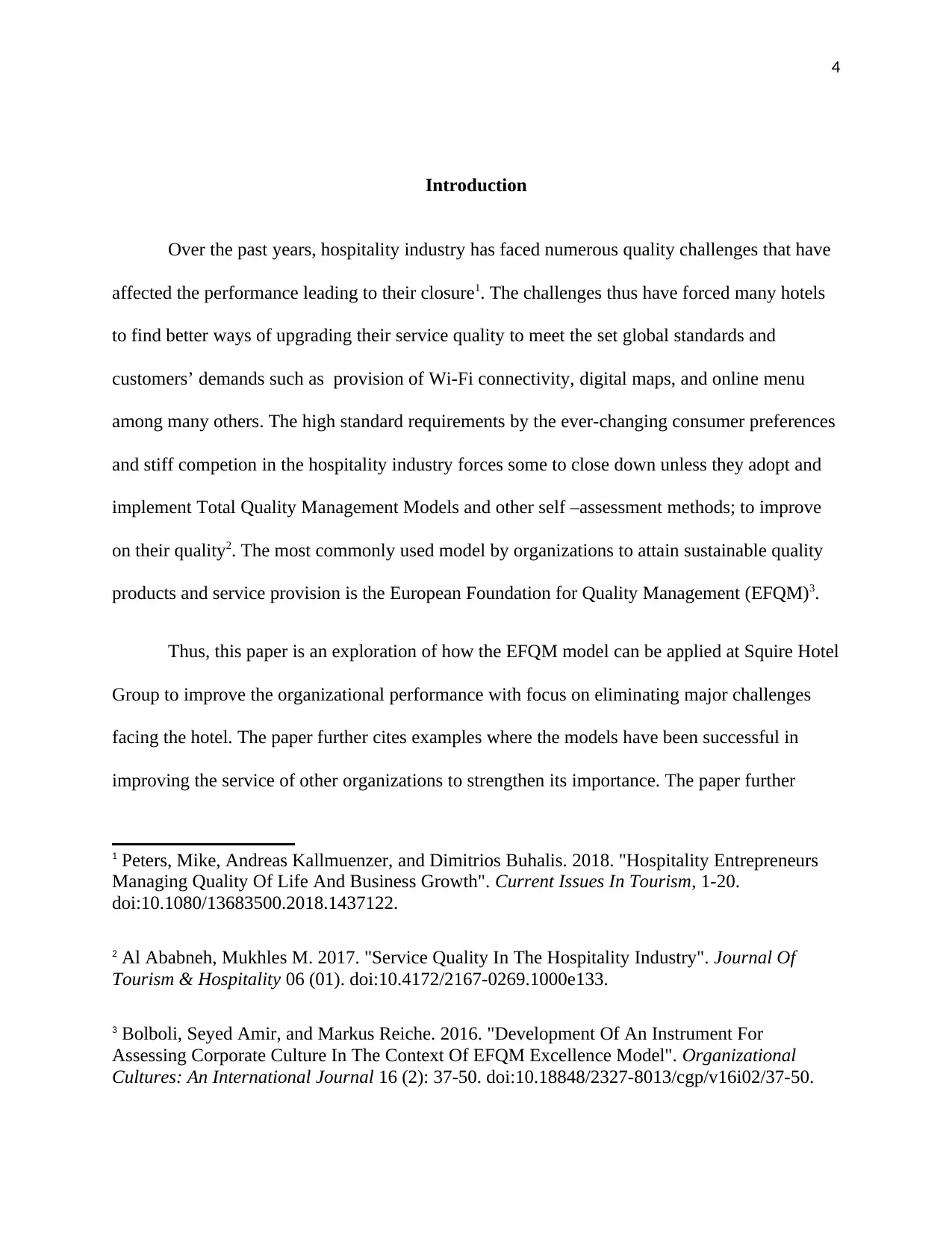
4
Introduction
Over the past years, hospitality industry has faced numerous quality challenges that have
affected the performance leading to their closure1. The challenges thus have forced many hotels
to find better ways of upgrading their service quality to meet the set global standards and
customers’ demands such as provision of Wi-Fi connectivity, digital maps, and online menu
among many others. The high standard requirements by the ever-changing consumer preferences
and stiff competion in the hospitality industry forces some to close down unless they adopt and
implement Total Quality Management Models and other self –assessment methods; to improve
on their quality2. The most commonly used model by organizations to attain sustainable quality
products and service provision is the European Foundation for Quality Management (EFQM)3.
Thus, this paper is an exploration of how the EFQM model can be applied at Squire Hotel
Group to improve the organizational performance with focus on eliminating major challenges
facing the hotel. The paper further cites examples where the models have been successful in
improving the service of other organizations to strengthen its importance. The paper further
1 Peters, Mike, Andreas Kallmuenzer, and Dimitrios Buhalis. 2018. "Hospitality Entrepreneurs
Managing Quality Of Life And Business Growth". Current Issues In Tourism, 1-20.
doi:10.1080/13683500.2018.1437122.
2 Al Ababneh, Mukhles M. 2017. "Service Quality In The Hospitality Industry". Journal Of
Tourism & Hospitality 06 (01). doi:10.4172/2167-0269.1000e133.
3 Bolboli, Seyed Amir, and Markus Reiche. 2016. "Development Of An Instrument For
Assessing Corporate Culture In The Context Of EFQM Excellence Model". Organizational
Cultures: An International Journal 16 (2): 37-50. doi:10.18848/2327-8013/cgp/v16i02/37-50.
Introduction
Over the past years, hospitality industry has faced numerous quality challenges that have
affected the performance leading to their closure1. The challenges thus have forced many hotels
to find better ways of upgrading their service quality to meet the set global standards and
customers’ demands such as provision of Wi-Fi connectivity, digital maps, and online menu
among many others. The high standard requirements by the ever-changing consumer preferences
and stiff competion in the hospitality industry forces some to close down unless they adopt and
implement Total Quality Management Models and other self –assessment methods; to improve
on their quality2. The most commonly used model by organizations to attain sustainable quality
products and service provision is the European Foundation for Quality Management (EFQM)3.
Thus, this paper is an exploration of how the EFQM model can be applied at Squire Hotel
Group to improve the organizational performance with focus on eliminating major challenges
facing the hotel. The paper further cites examples where the models have been successful in
improving the service of other organizations to strengthen its importance. The paper further
1 Peters, Mike, Andreas Kallmuenzer, and Dimitrios Buhalis. 2018. "Hospitality Entrepreneurs
Managing Quality Of Life And Business Growth". Current Issues In Tourism, 1-20.
doi:10.1080/13683500.2018.1437122.
2 Al Ababneh, Mukhles M. 2017. "Service Quality In The Hospitality Industry". Journal Of
Tourism & Hospitality 06 (01). doi:10.4172/2167-0269.1000e133.
3 Bolboli, Seyed Amir, and Markus Reiche. 2016. "Development Of An Instrument For
Assessing Corporate Culture In The Context Of EFQM Excellence Model". Organizational
Cultures: An International Journal 16 (2): 37-50. doi:10.18848/2327-8013/cgp/v16i02/37-50.
Paraphrase This Document
Need a fresh take? Get an instant paraphrase of this document with our AI Paraphraser
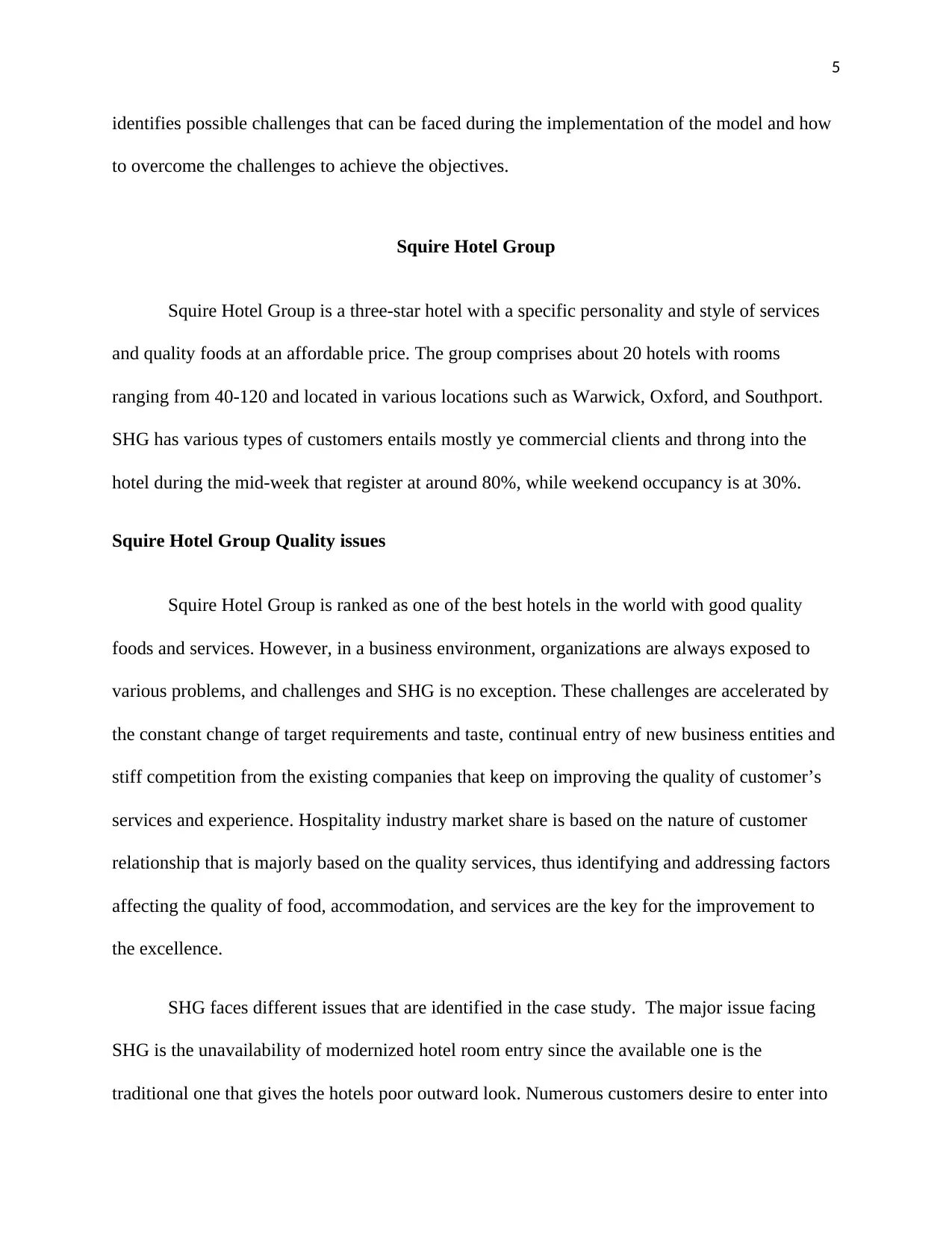
5
identifies possible challenges that can be faced during the implementation of the model and how
to overcome the challenges to achieve the objectives.
Squire Hotel Group
Squire Hotel Group is a three-star hotel with a specific personality and style of services
and quality foods at an affordable price. The group comprises about 20 hotels with rooms
ranging from 40-120 and located in various locations such as Warwick, Oxford, and Southport.
SHG has various types of customers entails mostly ye commercial clients and throng into the
hotel during the mid-week that register at around 80%, while weekend occupancy is at 30%.
Squire Hotel Group Quality issues
Squire Hotel Group is ranked as one of the best hotels in the world with good quality
foods and services. However, in a business environment, organizations are always exposed to
various problems, and challenges and SHG is no exception. These challenges are accelerated by
the constant change of target requirements and taste, continual entry of new business entities and
stiff competition from the existing companies that keep on improving the quality of customer’s
services and experience. Hospitality industry market share is based on the nature of customer
relationship that is majorly based on the quality services, thus identifying and addressing factors
affecting the quality of food, accommodation, and services are the key for the improvement to
the excellence.
SHG faces different issues that are identified in the case study. The major issue facing
SHG is the unavailability of modernized hotel room entry since the available one is the
traditional one that gives the hotels poor outward look. Numerous customers desire to enter into
identifies possible challenges that can be faced during the implementation of the model and how
to overcome the challenges to achieve the objectives.
Squire Hotel Group
Squire Hotel Group is a three-star hotel with a specific personality and style of services
and quality foods at an affordable price. The group comprises about 20 hotels with rooms
ranging from 40-120 and located in various locations such as Warwick, Oxford, and Southport.
SHG has various types of customers entails mostly ye commercial clients and throng into the
hotel during the mid-week that register at around 80%, while weekend occupancy is at 30%.
Squire Hotel Group Quality issues
Squire Hotel Group is ranked as one of the best hotels in the world with good quality
foods and services. However, in a business environment, organizations are always exposed to
various problems, and challenges and SHG is no exception. These challenges are accelerated by
the constant change of target requirements and taste, continual entry of new business entities and
stiff competition from the existing companies that keep on improving the quality of customer’s
services and experience. Hospitality industry market share is based on the nature of customer
relationship that is majorly based on the quality services, thus identifying and addressing factors
affecting the quality of food, accommodation, and services are the key for the improvement to
the excellence.
SHG faces different issues that are identified in the case study. The major issue facing
SHG is the unavailability of modernized hotel room entry since the available one is the
traditional one that gives the hotels poor outward look. Numerous customers desire to enter into
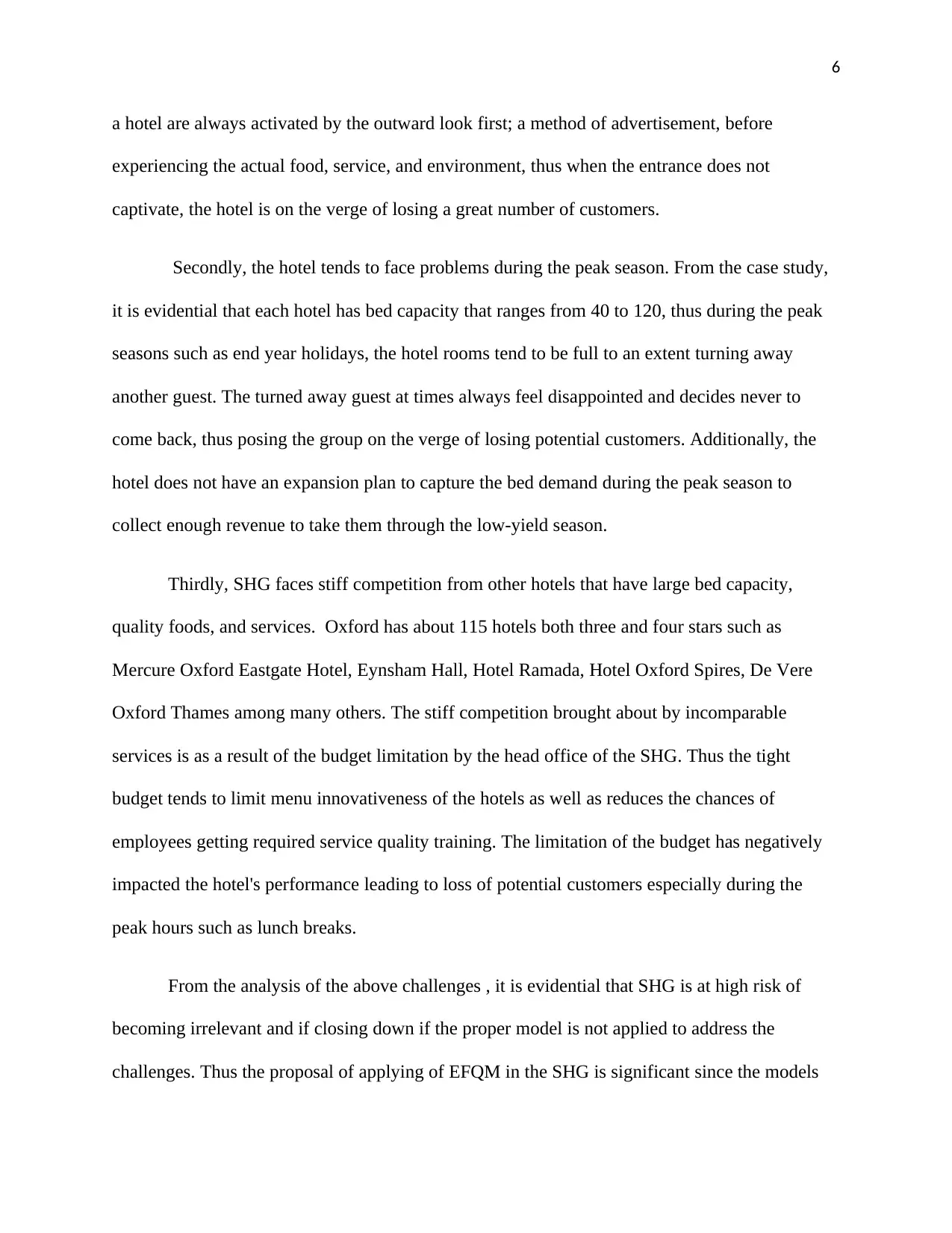
6
a hotel are always activated by the outward look first; a method of advertisement, before
experiencing the actual food, service, and environment, thus when the entrance does not
captivate, the hotel is on the verge of losing a great number of customers.
Secondly, the hotel tends to face problems during the peak season. From the case study,
it is evidential that each hotel has bed capacity that ranges from 40 to 120, thus during the peak
seasons such as end year holidays, the hotel rooms tend to be full to an extent turning away
another guest. The turned away guest at times always feel disappointed and decides never to
come back, thus posing the group on the verge of losing potential customers. Additionally, the
hotel does not have an expansion plan to capture the bed demand during the peak season to
collect enough revenue to take them through the low-yield season.
Thirdly, SHG faces stiff competition from other hotels that have large bed capacity,
quality foods, and services. Oxford has about 115 hotels both three and four stars such as
Mercure Oxford Eastgate Hotel, Eynsham Hall, Hotel Ramada, Hotel Oxford Spires, De Vere
Oxford Thames among many others. The stiff competition brought about by incomparable
services is as a result of the budget limitation by the head office of the SHG. Thus the tight
budget tends to limit menu innovativeness of the hotels as well as reduces the chances of
employees getting required service quality training. The limitation of the budget has negatively
impacted the hotel's performance leading to loss of potential customers especially during the
peak hours such as lunch breaks.
From the analysis of the above challenges , it is evidential that SHG is at high risk of
becoming irrelevant and if closing down if the proper model is not applied to address the
challenges. Thus the proposal of applying of EFQM in the SHG is significant since the models
a hotel are always activated by the outward look first; a method of advertisement, before
experiencing the actual food, service, and environment, thus when the entrance does not
captivate, the hotel is on the verge of losing a great number of customers.
Secondly, the hotel tends to face problems during the peak season. From the case study,
it is evidential that each hotel has bed capacity that ranges from 40 to 120, thus during the peak
seasons such as end year holidays, the hotel rooms tend to be full to an extent turning away
another guest. The turned away guest at times always feel disappointed and decides never to
come back, thus posing the group on the verge of losing potential customers. Additionally, the
hotel does not have an expansion plan to capture the bed demand during the peak season to
collect enough revenue to take them through the low-yield season.
Thirdly, SHG faces stiff competition from other hotels that have large bed capacity,
quality foods, and services. Oxford has about 115 hotels both three and four stars such as
Mercure Oxford Eastgate Hotel, Eynsham Hall, Hotel Ramada, Hotel Oxford Spires, De Vere
Oxford Thames among many others. The stiff competition brought about by incomparable
services is as a result of the budget limitation by the head office of the SHG. Thus the tight
budget tends to limit menu innovativeness of the hotels as well as reduces the chances of
employees getting required service quality training. The limitation of the budget has negatively
impacted the hotel's performance leading to loss of potential customers especially during the
peak hours such as lunch breaks.
From the analysis of the above challenges , it is evidential that SHG is at high risk of
becoming irrelevant and if closing down if the proper model is not applied to address the
challenges. Thus the proposal of applying of EFQM in the SHG is significant since the models
⊘ This is a preview!⊘
Do you want full access?
Subscribe today to unlock all pages.

Trusted by 1+ million students worldwide
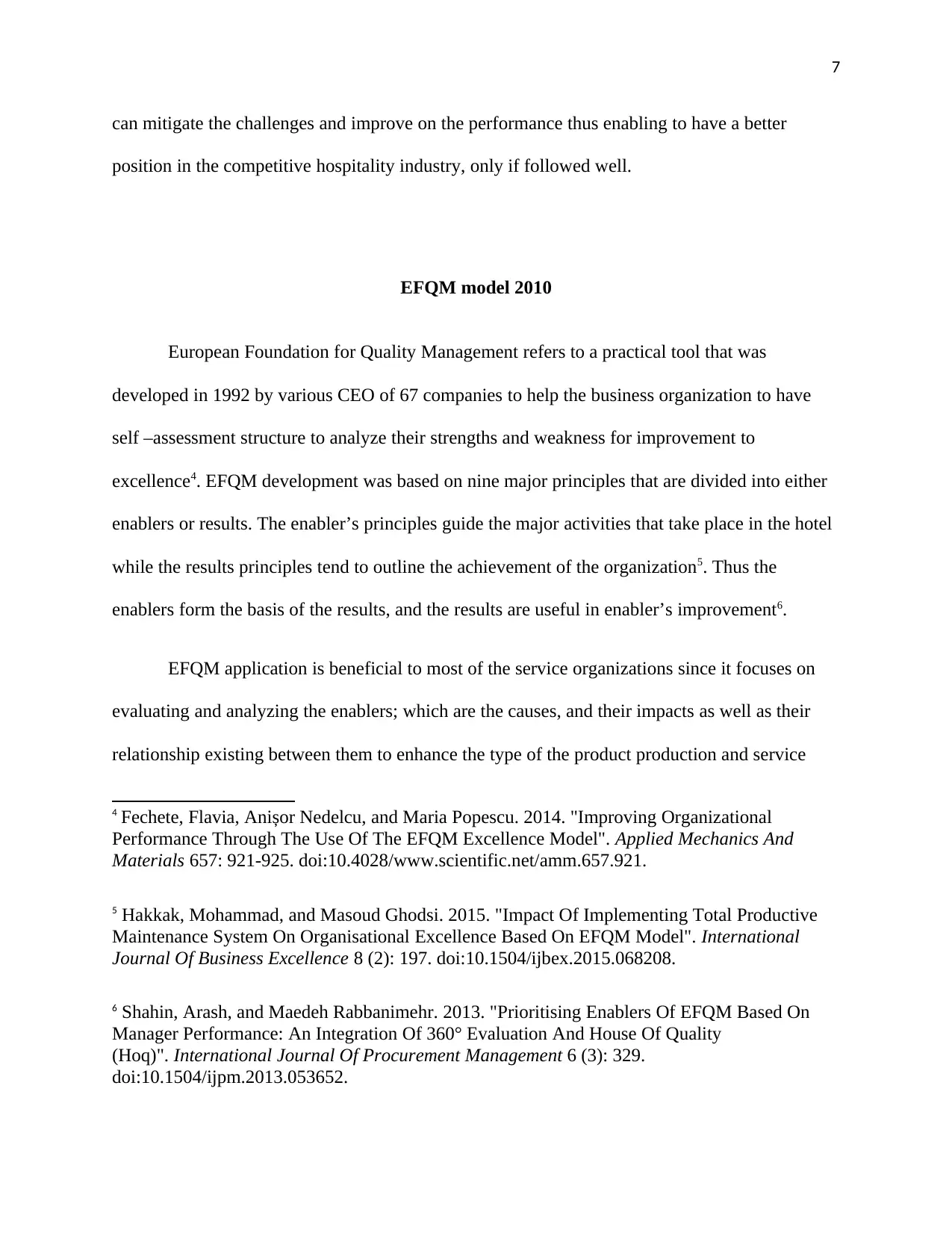
7
can mitigate the challenges and improve on the performance thus enabling to have a better
position in the competitive hospitality industry, only if followed well.
EFQM model 2010
European Foundation for Quality Management refers to a practical tool that was
developed in 1992 by various CEO of 67 companies to help the business organization to have
self –assessment structure to analyze their strengths and weakness for improvement to
excellence4. EFQM development was based on nine major principles that are divided into either
enablers or results. The enabler’s principles guide the major activities that take place in the hotel
while the results principles tend to outline the achievement of the organization5. Thus the
enablers form the basis of the results, and the results are useful in enabler’s improvement6.
EFQM application is beneficial to most of the service organizations since it focuses on
evaluating and analyzing the enablers; which are the causes, and their impacts as well as their
relationship existing between them to enhance the type of the product production and service
4 Fechete, Flavia, Anișor Nedelcu, and Maria Popescu. 2014. "Improving Organizational
Performance Through The Use Of The EFQM Excellence Model". Applied Mechanics And
Materials 657: 921-925. doi:10.4028/www.scientific.net/amm.657.921.
5 Hakkak, Mohammad, and Masoud Ghodsi. 2015. "Impact Of Implementing Total Productive
Maintenance System On Organisational Excellence Based On EFQM Model". International
Journal Of Business Excellence 8 (2): 197. doi:10.1504/ijbex.2015.068208.
6 Shahin, Arash, and Maedeh Rabbanimehr. 2013. "Prioritising Enablers Of EFQM Based On
Manager Performance: An Integration Of 360° Evaluation And House Of Quality
(Hoq)". International Journal Of Procurement Management 6 (3): 329.
doi:10.1504/ijpm.2013.053652.
can mitigate the challenges and improve on the performance thus enabling to have a better
position in the competitive hospitality industry, only if followed well.
EFQM model 2010
European Foundation for Quality Management refers to a practical tool that was
developed in 1992 by various CEO of 67 companies to help the business organization to have
self –assessment structure to analyze their strengths and weakness for improvement to
excellence4. EFQM development was based on nine major principles that are divided into either
enablers or results. The enabler’s principles guide the major activities that take place in the hotel
while the results principles tend to outline the achievement of the organization5. Thus the
enablers form the basis of the results, and the results are useful in enabler’s improvement6.
EFQM application is beneficial to most of the service organizations since it focuses on
evaluating and analyzing the enablers; which are the causes, and their impacts as well as their
relationship existing between them to enhance the type of the product production and service
4 Fechete, Flavia, Anișor Nedelcu, and Maria Popescu. 2014. "Improving Organizational
Performance Through The Use Of The EFQM Excellence Model". Applied Mechanics And
Materials 657: 921-925. doi:10.4028/www.scientific.net/amm.657.921.
5 Hakkak, Mohammad, and Masoud Ghodsi. 2015. "Impact Of Implementing Total Productive
Maintenance System On Organisational Excellence Based On EFQM Model". International
Journal Of Business Excellence 8 (2): 197. doi:10.1504/ijbex.2015.068208.
6 Shahin, Arash, and Maedeh Rabbanimehr. 2013. "Prioritising Enablers Of EFQM Based On
Manager Performance: An Integration Of 360° Evaluation And House Of Quality
(Hoq)". International Journal Of Procurement Management 6 (3): 329.
doi:10.1504/ijpm.2013.053652.
Paraphrase This Document
Need a fresh take? Get an instant paraphrase of this document with our AI Paraphraser
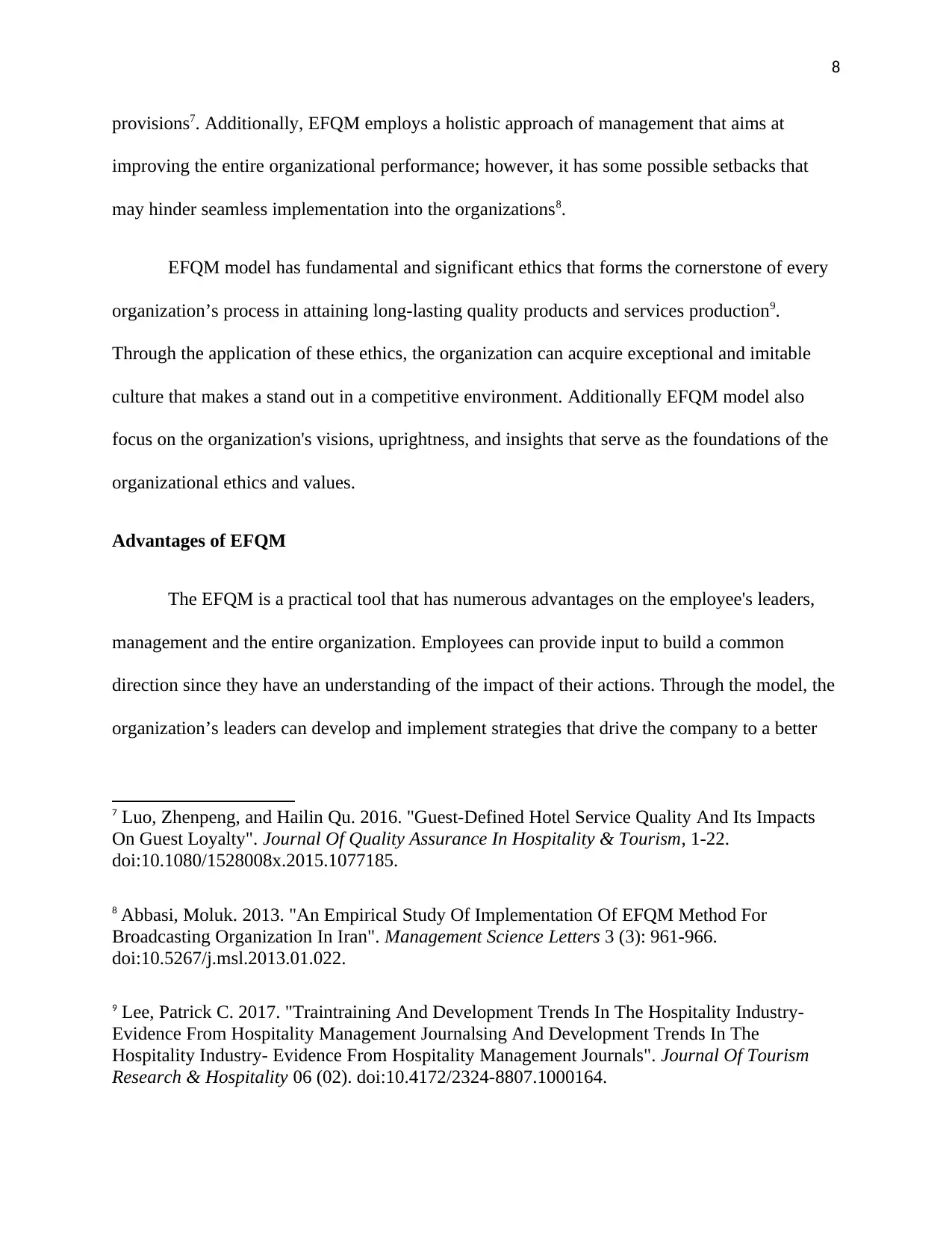
8
provisions7. Additionally, EFQM employs a holistic approach of management that aims at
improving the entire organizational performance; however, it has some possible setbacks that
may hinder seamless implementation into the organizations8.
EFQM model has fundamental and significant ethics that forms the cornerstone of every
organization’s process in attaining long-lasting quality products and services production9.
Through the application of these ethics, the organization can acquire exceptional and imitable
culture that makes a stand out in a competitive environment. Additionally EFQM model also
focus on the organization's visions, uprightness, and insights that serve as the foundations of the
organizational ethics and values.
Advantages of EFQM
The EFQM is a practical tool that has numerous advantages on the employee's leaders,
management and the entire organization. Employees can provide input to build a common
direction since they have an understanding of the impact of their actions. Through the model, the
organization’s leaders can develop and implement strategies that drive the company to a better
7 Luo, Zhenpeng, and Hailin Qu. 2016. "Guest-Defined Hotel Service Quality And Its Impacts
On Guest Loyalty". Journal Of Quality Assurance In Hospitality & Tourism, 1-22.
doi:10.1080/1528008x.2015.1077185.
8 Abbasi, Moluk. 2013. "An Empirical Study Of Implementation Of EFQM Method For
Broadcasting Organization In Iran". Management Science Letters 3 (3): 961-966.
doi:10.5267/j.msl.2013.01.022.
9 Lee, Patrick C. 2017. "Traintraining And Development Trends In The Hospitality Industry-
Evidence From Hospitality Management Journalsing And Development Trends In The
Hospitality Industry- Evidence From Hospitality Management Journals". Journal Of Tourism
Research & Hospitality 06 (02). doi:10.4172/2324-8807.1000164.
provisions7. Additionally, EFQM employs a holistic approach of management that aims at
improving the entire organizational performance; however, it has some possible setbacks that
may hinder seamless implementation into the organizations8.
EFQM model has fundamental and significant ethics that forms the cornerstone of every
organization’s process in attaining long-lasting quality products and services production9.
Through the application of these ethics, the organization can acquire exceptional and imitable
culture that makes a stand out in a competitive environment. Additionally EFQM model also
focus on the organization's visions, uprightness, and insights that serve as the foundations of the
organizational ethics and values.
Advantages of EFQM
The EFQM is a practical tool that has numerous advantages on the employee's leaders,
management and the entire organization. Employees can provide input to build a common
direction since they have an understanding of the impact of their actions. Through the model, the
organization’s leaders can develop and implement strategies that drive the company to a better
7 Luo, Zhenpeng, and Hailin Qu. 2016. "Guest-Defined Hotel Service Quality And Its Impacts
On Guest Loyalty". Journal Of Quality Assurance In Hospitality & Tourism, 1-22.
doi:10.1080/1528008x.2015.1077185.
8 Abbasi, Moluk. 2013. "An Empirical Study Of Implementation Of EFQM Method For
Broadcasting Organization In Iran". Management Science Letters 3 (3): 961-966.
doi:10.5267/j.msl.2013.01.022.
9 Lee, Patrick C. 2017. "Traintraining And Development Trends In The Hospitality Industry-
Evidence From Hospitality Management Journalsing And Development Trends In The
Hospitality Industry- Evidence From Hospitality Management Journals". Journal Of Tourism
Research & Hospitality 06 (02). doi:10.4172/2324-8807.1000164.
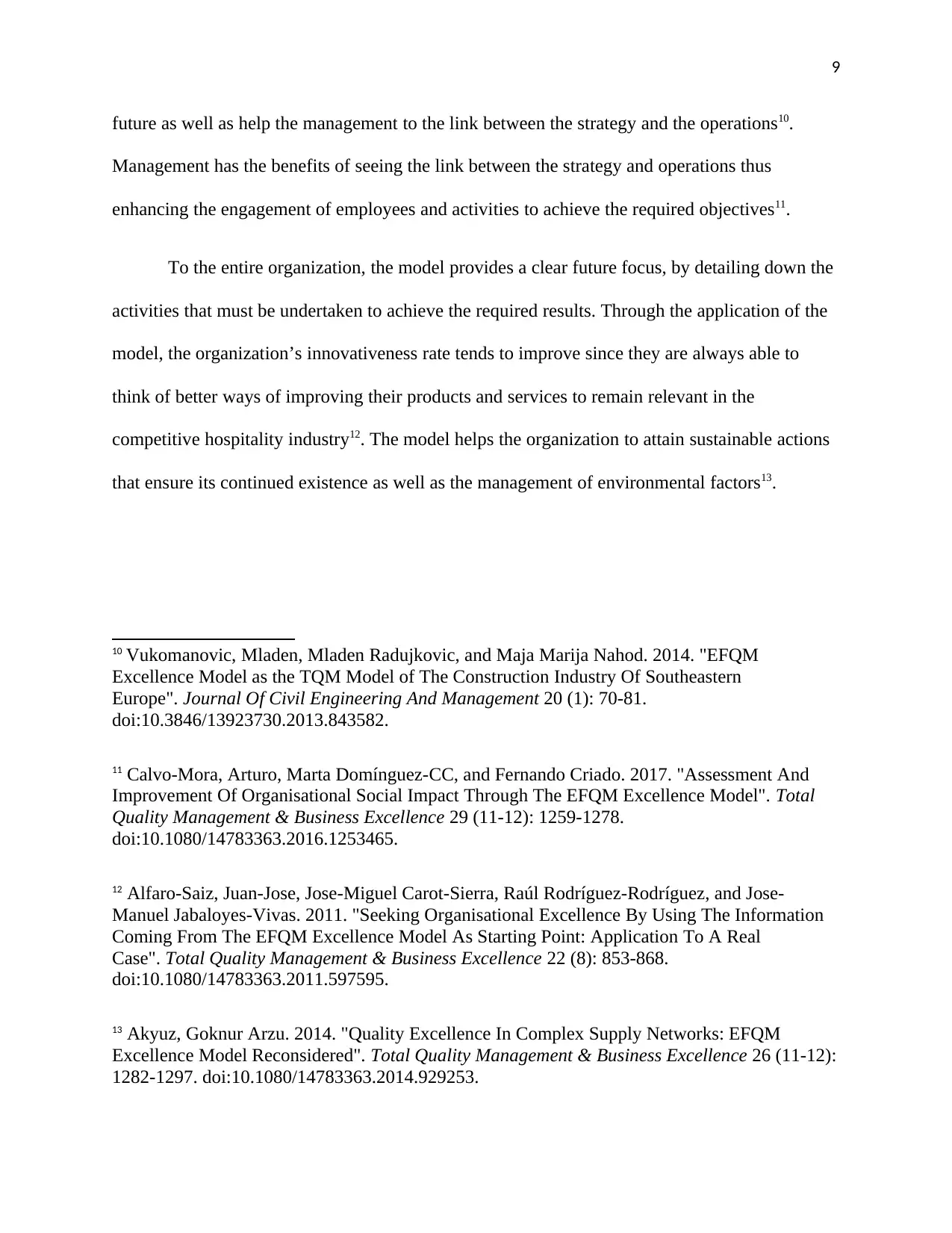
9
future as well as help the management to the link between the strategy and the operations10.
Management has the benefits of seeing the link between the strategy and operations thus
enhancing the engagement of employees and activities to achieve the required objectives11.
To the entire organization, the model provides a clear future focus, by detailing down the
activities that must be undertaken to achieve the required results. Through the application of the
model, the organization’s innovativeness rate tends to improve since they are always able to
think of better ways of improving their products and services to remain relevant in the
competitive hospitality industry12. The model helps the organization to attain sustainable actions
that ensure its continued existence as well as the management of environmental factors13.
10 Vukomanovic, Mladen, Mladen Radujkovic, and Maja Marija Nahod. 2014. "EFQM
Excellence Model as the TQM Model of The Construction Industry Of Southeastern
Europe". Journal Of Civil Engineering And Management 20 (1): 70-81.
doi:10.3846/13923730.2013.843582.
11 Calvo-Mora, Arturo, Marta Domínguez-CC, and Fernando Criado. 2017. "Assessment And
Improvement Of Organisational Social Impact Through The EFQM Excellence Model". Total
Quality Management & Business Excellence 29 (11-12): 1259-1278.
doi:10.1080/14783363.2016.1253465.
12 Alfaro-Saiz, Juan-Jose, Jose-Miguel Carot-Sierra, Raúl Rodríguez-Rodríguez, and Jose-
Manuel Jabaloyes-Vivas. 2011. "Seeking Organisational Excellence By Using The Information
Coming From The EFQM Excellence Model As Starting Point: Application To A Real
Case". Total Quality Management & Business Excellence 22 (8): 853-868.
doi:10.1080/14783363.2011.597595.
13 Akyuz, Goknur Arzu. 2014. "Quality Excellence In Complex Supply Networks: EFQM
Excellence Model Reconsidered". Total Quality Management & Business Excellence 26 (11-12):
1282-1297. doi:10.1080/14783363.2014.929253.
future as well as help the management to the link between the strategy and the operations10.
Management has the benefits of seeing the link between the strategy and operations thus
enhancing the engagement of employees and activities to achieve the required objectives11.
To the entire organization, the model provides a clear future focus, by detailing down the
activities that must be undertaken to achieve the required results. Through the application of the
model, the organization’s innovativeness rate tends to improve since they are always able to
think of better ways of improving their products and services to remain relevant in the
competitive hospitality industry12. The model helps the organization to attain sustainable actions
that ensure its continued existence as well as the management of environmental factors13.
10 Vukomanovic, Mladen, Mladen Radujkovic, and Maja Marija Nahod. 2014. "EFQM
Excellence Model as the TQM Model of The Construction Industry Of Southeastern
Europe". Journal Of Civil Engineering And Management 20 (1): 70-81.
doi:10.3846/13923730.2013.843582.
11 Calvo-Mora, Arturo, Marta Domínguez-CC, and Fernando Criado. 2017. "Assessment And
Improvement Of Organisational Social Impact Through The EFQM Excellence Model". Total
Quality Management & Business Excellence 29 (11-12): 1259-1278.
doi:10.1080/14783363.2016.1253465.
12 Alfaro-Saiz, Juan-Jose, Jose-Miguel Carot-Sierra, Raúl Rodríguez-Rodríguez, and Jose-
Manuel Jabaloyes-Vivas. 2011. "Seeking Organisational Excellence By Using The Information
Coming From The EFQM Excellence Model As Starting Point: Application To A Real
Case". Total Quality Management & Business Excellence 22 (8): 853-868.
doi:10.1080/14783363.2011.597595.
13 Akyuz, Goknur Arzu. 2014. "Quality Excellence In Complex Supply Networks: EFQM
Excellence Model Reconsidered". Total Quality Management & Business Excellence 26 (11-12):
1282-1297. doi:10.1080/14783363.2014.929253.
⊘ This is a preview!⊘
Do you want full access?
Subscribe today to unlock all pages.

Trusted by 1+ million students worldwide
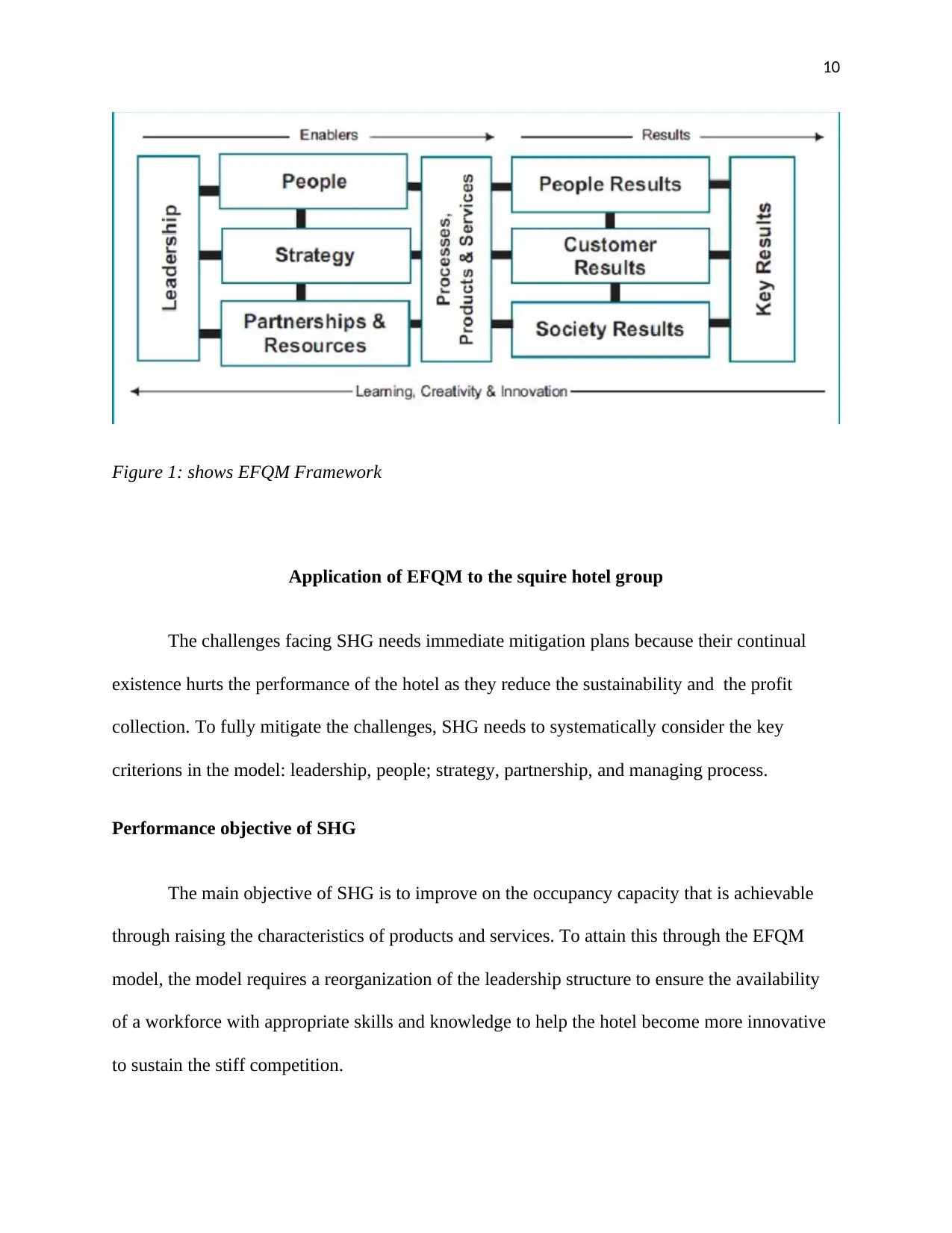
10
Figure 1: shows EFQM Framework
Application of EFQM to the squire hotel group
The challenges facing SHG needs immediate mitigation plans because their continual
existence hurts the performance of the hotel as they reduce the sustainability and the profit
collection. To fully mitigate the challenges, SHG needs to systematically consider the key
criterions in the model: leadership, people; strategy, partnership, and managing process.
Performance objective of SHG
The main objective of SHG is to improve on the occupancy capacity that is achievable
through raising the characteristics of products and services. To attain this through the EFQM
model, the model requires a reorganization of the leadership structure to ensure the availability
of a workforce with appropriate skills and knowledge to help the hotel become more innovative
to sustain the stiff competition.
Figure 1: shows EFQM Framework
Application of EFQM to the squire hotel group
The challenges facing SHG needs immediate mitigation plans because their continual
existence hurts the performance of the hotel as they reduce the sustainability and the profit
collection. To fully mitigate the challenges, SHG needs to systematically consider the key
criterions in the model: leadership, people; strategy, partnership, and managing process.
Performance objective of SHG
The main objective of SHG is to improve on the occupancy capacity that is achievable
through raising the characteristics of products and services. To attain this through the EFQM
model, the model requires a reorganization of the leadership structure to ensure the availability
of a workforce with appropriate skills and knowledge to help the hotel become more innovative
to sustain the stiff competition.
Paraphrase This Document
Need a fresh take? Get an instant paraphrase of this document with our AI Paraphraser
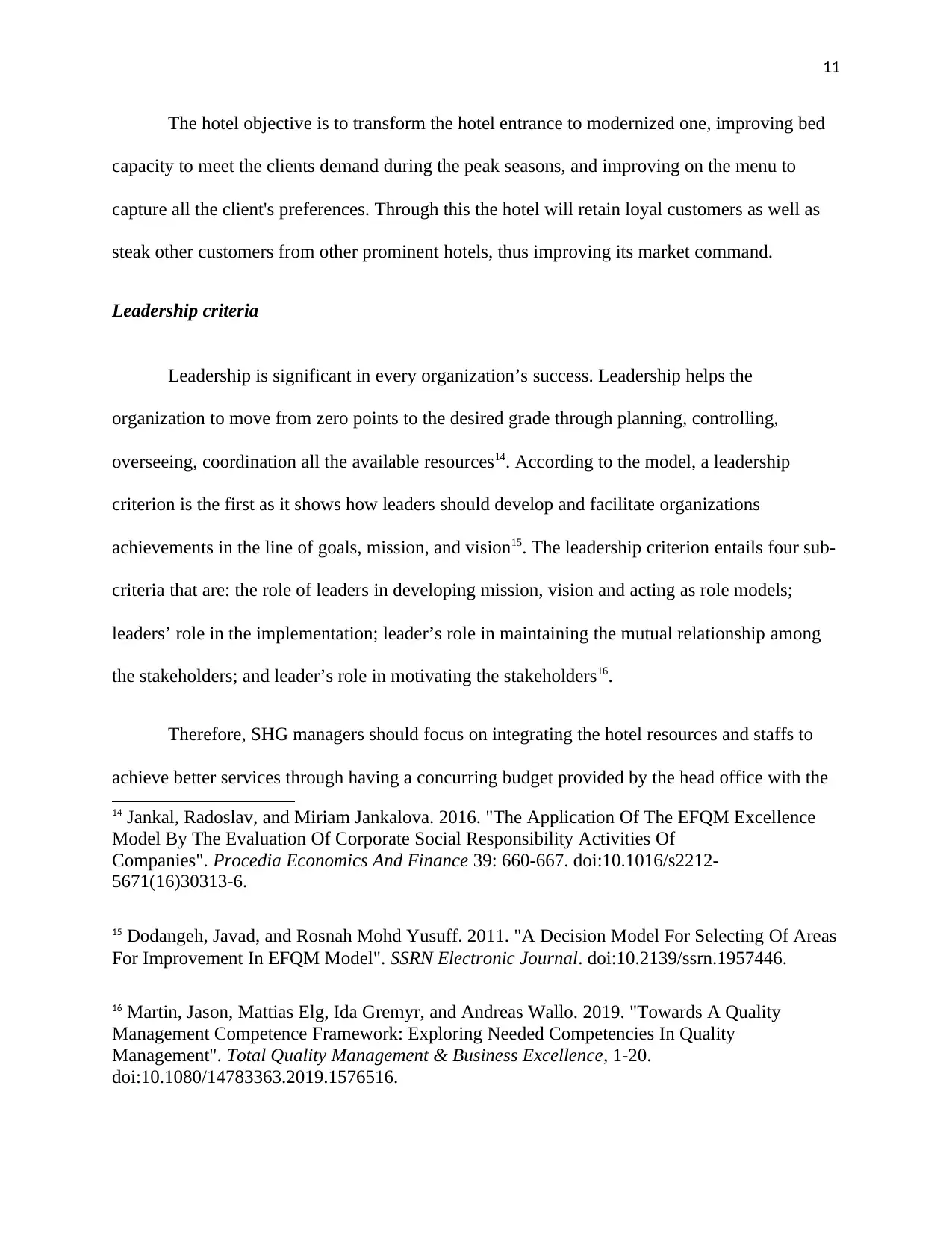
11
The hotel objective is to transform the hotel entrance to modernized one, improving bed
capacity to meet the clients demand during the peak seasons, and improving on the menu to
capture all the client's preferences. Through this the hotel will retain loyal customers as well as
steak other customers from other prominent hotels, thus improving its market command.
Leadership criteria
Leadership is significant in every organization’s success. Leadership helps the
organization to move from zero points to the desired grade through planning, controlling,
overseeing, coordination all the available resources14. According to the model, a leadership
criterion is the first as it shows how leaders should develop and facilitate organizations
achievements in the line of goals, mission, and vision15. The leadership criterion entails four sub-
criteria that are: the role of leaders in developing mission, vision and acting as role models;
leaders’ role in the implementation; leader’s role in maintaining the mutual relationship among
the stakeholders; and leader’s role in motivating the stakeholders16.
Therefore, SHG managers should focus on integrating the hotel resources and staffs to
achieve better services through having a concurring budget provided by the head office with the
14 Jankal, Radoslav, and Miriam Jankalova. 2016. "The Application Of The EFQM Excellence
Model By The Evaluation Of Corporate Social Responsibility Activities Of
Companies". Procedia Economics And Finance 39: 660-667. doi:10.1016/s2212-
5671(16)30313-6.
15 Dodangeh, Javad, and Rosnah Mohd Yusuff. 2011. "A Decision Model For Selecting Of Areas
For Improvement In EFQM Model". SSRN Electronic Journal. doi:10.2139/ssrn.1957446.
16 Martin, Jason, Mattias Elg, Ida Gremyr, and Andreas Wallo. 2019. "Towards A Quality
Management Competence Framework: Exploring Needed Competencies In Quality
Management". Total Quality Management & Business Excellence, 1-20.
doi:10.1080/14783363.2019.1576516.
The hotel objective is to transform the hotel entrance to modernized one, improving bed
capacity to meet the clients demand during the peak seasons, and improving on the menu to
capture all the client's preferences. Through this the hotel will retain loyal customers as well as
steak other customers from other prominent hotels, thus improving its market command.
Leadership criteria
Leadership is significant in every organization’s success. Leadership helps the
organization to move from zero points to the desired grade through planning, controlling,
overseeing, coordination all the available resources14. According to the model, a leadership
criterion is the first as it shows how leaders should develop and facilitate organizations
achievements in the line of goals, mission, and vision15. The leadership criterion entails four sub-
criteria that are: the role of leaders in developing mission, vision and acting as role models;
leaders’ role in the implementation; leader’s role in maintaining the mutual relationship among
the stakeholders; and leader’s role in motivating the stakeholders16.
Therefore, SHG managers should focus on integrating the hotel resources and staffs to
achieve better services through having a concurring budget provided by the head office with the
14 Jankal, Radoslav, and Miriam Jankalova. 2016. "The Application Of The EFQM Excellence
Model By The Evaluation Of Corporate Social Responsibility Activities Of
Companies". Procedia Economics And Finance 39: 660-667. doi:10.1016/s2212-
5671(16)30313-6.
15 Dodangeh, Javad, and Rosnah Mohd Yusuff. 2011. "A Decision Model For Selecting Of Areas
For Improvement In EFQM Model". SSRN Electronic Journal. doi:10.2139/ssrn.1957446.
16 Martin, Jason, Mattias Elg, Ida Gremyr, and Andreas Wallo. 2019. "Towards A Quality
Management Competence Framework: Exploring Needed Competencies In Quality
Management". Total Quality Management & Business Excellence, 1-20.
doi:10.1080/14783363.2019.1576516.
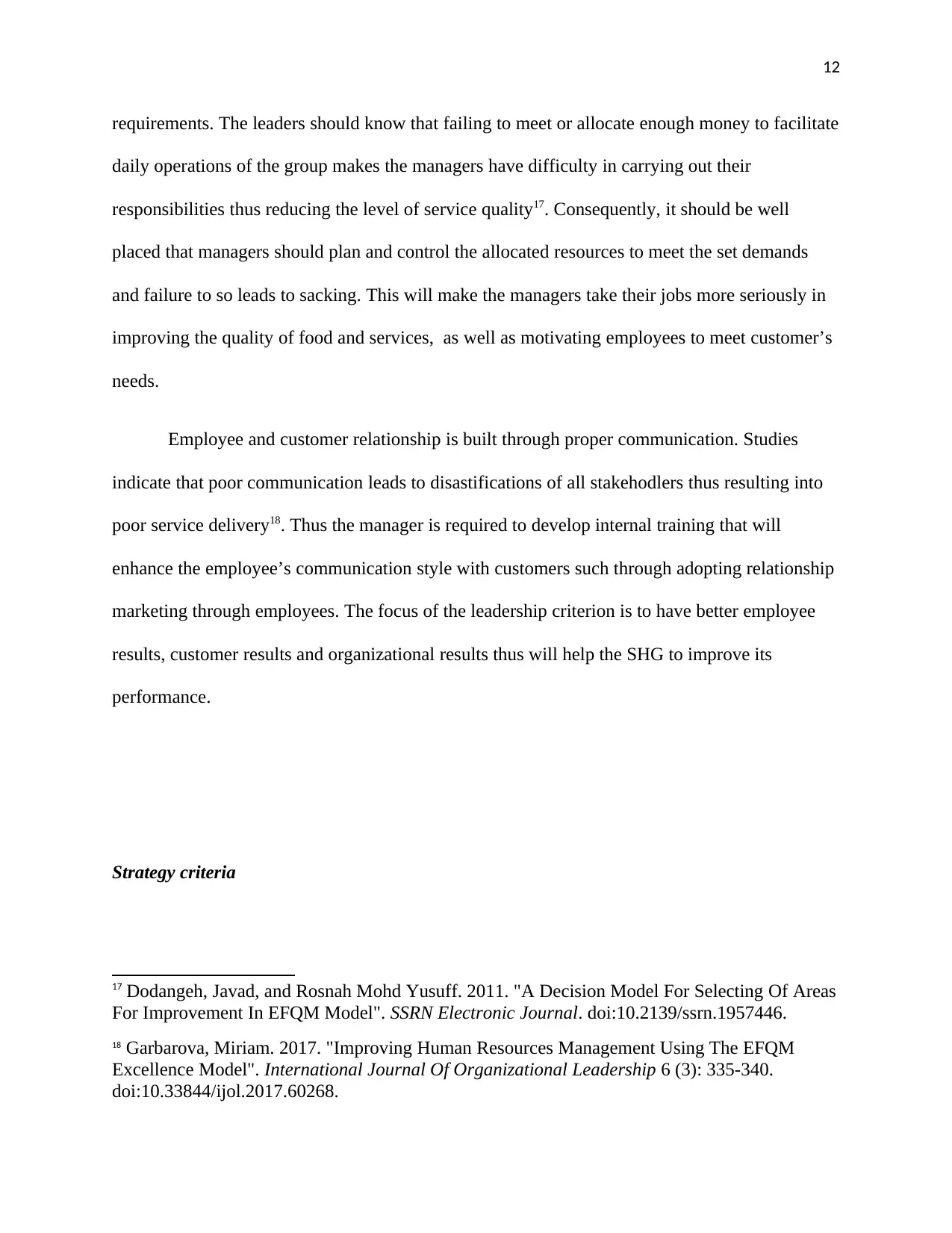
12
requirements. The leaders should know that failing to meet or allocate enough money to facilitate
daily operations of the group makes the managers have difficulty in carrying out their
responsibilities thus reducing the level of service quality17. Consequently, it should be well
placed that managers should plan and control the allocated resources to meet the set demands
and failure to so leads to sacking. This will make the managers take their jobs more seriously in
improving the quality of food and services, as well as motivating employees to meet customer’s
needs.
Employee and customer relationship is built through proper communication. Studies
indicate that poor communication leads to disastifications of all stakehodlers thus resulting into
poor service delivery18. Thus the manager is required to develop internal training that will
enhance the employee’s communication style with customers such through adopting relationship
marketing through employees. The focus of the leadership criterion is to have better employee
results, customer results and organizational results thus will help the SHG to improve its
performance.
Strategy criteria
17 Dodangeh, Javad, and Rosnah Mohd Yusuff. 2011. "A Decision Model For Selecting Of Areas
For Improvement In EFQM Model". SSRN Electronic Journal. doi:10.2139/ssrn.1957446.
18 Garbarova, Miriam. 2017. "Improving Human Resources Management Using The EFQM
Excellence Model". International Journal Of Organizational Leadership 6 (3): 335-340.
doi:10.33844/ijol.2017.60268.
requirements. The leaders should know that failing to meet or allocate enough money to facilitate
daily operations of the group makes the managers have difficulty in carrying out their
responsibilities thus reducing the level of service quality17. Consequently, it should be well
placed that managers should plan and control the allocated resources to meet the set demands
and failure to so leads to sacking. This will make the managers take their jobs more seriously in
improving the quality of food and services, as well as motivating employees to meet customer’s
needs.
Employee and customer relationship is built through proper communication. Studies
indicate that poor communication leads to disastifications of all stakehodlers thus resulting into
poor service delivery18. Thus the manager is required to develop internal training that will
enhance the employee’s communication style with customers such through adopting relationship
marketing through employees. The focus of the leadership criterion is to have better employee
results, customer results and organizational results thus will help the SHG to improve its
performance.
Strategy criteria
17 Dodangeh, Javad, and Rosnah Mohd Yusuff. 2011. "A Decision Model For Selecting Of Areas
For Improvement In EFQM Model". SSRN Electronic Journal. doi:10.2139/ssrn.1957446.
18 Garbarova, Miriam. 2017. "Improving Human Resources Management Using The EFQM
Excellence Model". International Journal Of Organizational Leadership 6 (3): 335-340.
doi:10.33844/ijol.2017.60268.
⊘ This is a preview!⊘
Do you want full access?
Subscribe today to unlock all pages.

Trusted by 1+ million students worldwide
1 out of 25
Related Documents
Your All-in-One AI-Powered Toolkit for Academic Success.
+13062052269
info@desklib.com
Available 24*7 on WhatsApp / Email
![[object Object]](/_next/static/media/star-bottom.7253800d.svg)
Unlock your academic potential
Copyright © 2020–2026 A2Z Services. All Rights Reserved. Developed and managed by ZUCOL.





